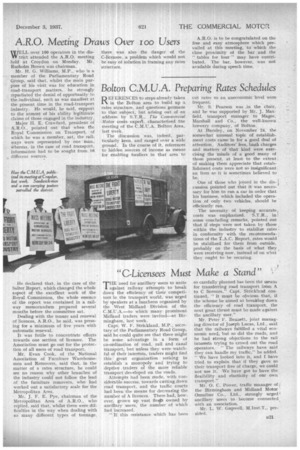"C-Licensees Must Make a Stand"
Page 19

If you've noticed an error in this article please click here to report it so we can fix it.
He declared that, in the case of the Salter Report, which changed the whole aspect of the excellent work of the Royal Commission, the whole essence of the report was contained in a railway memorandum prepared several months before the committee sat.
Dealing with the tenure and renewal of licences, A.R.O., he said, was pressing for a minimum of five years with automatic renewal.
It was futile to concentrate efforts towards one section of licensee. The Association must go out for the protection of all users of road transport.
Mr. Evan Cook, of the National Association of Furniture Warehousemen and Removers, said that, in the matter of a rates structure, he could see no reason why other branches of the industry could not follow the lead of the furniture removers, who had worked out a satisfactory scale for the Metropolitan Area.
Mr. J. F. E. Pye, chairman of the Metropolitan Area of A.R.O., who replied, said that, whilst there were difficulties in the way when dealing with so many different types of tonnage.
THE need for ancillary users to unite against railway attempts to break down the efficiency of their competitors in the transport world, was urged by speakers at a luncheon organized by the West Midland Division of the C.M.U.A.—to which many prominent Midland traders were invited--at Birmingham, last week.
Capt. W. F. Strickland, M.P., secretary of the Parliamentary Road Group, said hp could quite see that there might be some advantage in a form of co-ordination of road, rail and canal transport, but unless they were watchful of their interests, traders might find this great organization seeking to establish a monopoly and trying to deprive traders of the more reliable transport developed on the roads.
Attempts had been made, with considerable success, towards cutting.down road transport, and the traffic courts had been the means for decreasing the number of A licences. There had, however, grown up vast nests owned by ancillary users, the number Of which had increased.
" If this resistance which has been so carefully planned has been the means for transferring road transport from A to C licences," Capt. Strickland continued, "it must be obvious that, if the scheme be aimed at breaking down the efficiency of road transport, the next great thrust must be made against the ancillary user."
Mr. Peter F. Bennett, joint managing director of Joseph Lucas, Ltd., said that the railways fulfilled a vital economic need, but so did the roads, and he had strong objections to the rail interests trying to crowd out the road operators. " The railways have said they can handle my traffic," he added. " We have looked into it, and I have tried to explain that if they gave us their transport free of charge, we could not use it. We have got to have the flexibility and elasticity of our own transport." Mr. 0. C. Power, traffic manager of ; the Birmingham and Midland Motor Omnibus Co., Ltd., strongly urgedl ancillary users to become connected, with an association.
Mr. L. NV. Gupwell, M.Inst.T., presided.


































